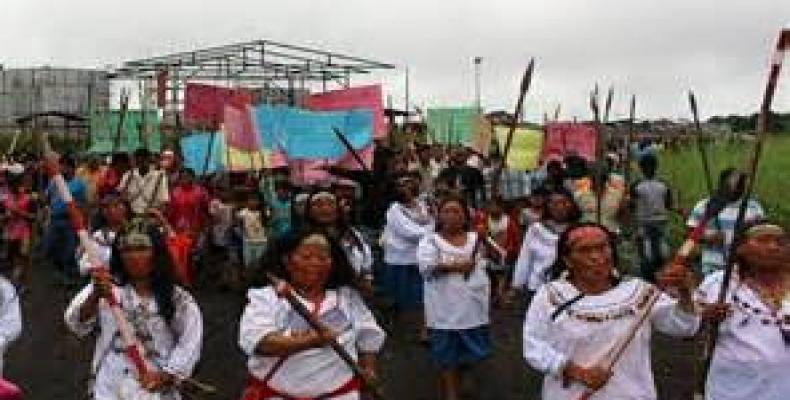Lima, January 31 (RHC-teleSUR) -- In Peru, indigenous people have forced a production stoppage at 14 oil wells, adding up to some 3100 barrels of oil per day.
Close to 400 Achuar indigenous people intensified their actions Thursday, blockading production of 14 oil wells from the multinational, PlusPetrol.
Since last Monday, Protestors had taken over territories that the company started exploiting, however the actions escalated to blockading the circulation of any ships through the river Tigre.
Achuar activists are currently in possession of 8 company ships and have declared that they will not back down until State officials and company executives meet with them.
Multimillion dollar oil extractions have been in place in the region for the last 43 years, but poverty among the population in the area are high and environmental contamination common.
The Indigenous community of Pampa Hermosa in the Region of Loreto are demanding payments in compensation for the use of their lands and assurances environmental damage already occurring will be prevented.
Protestors are being watched by a contingent of the Special Activities Division of the Peruvian police, who have not yet taken any action to clear them from the area.
According to Carlos Sandi, chief of the Federation of Native Communities of Corrientes, “for three months, PlusPetrol has been paying compensation to other communities around Pampa Hermosa…However, they do not want to pay our community.”
Sandi also expressed concern over the presence of police forces. we don’t want anything unfortunate to occur, we want a dialog as soon as possible,” Sandi said.
The community leader also noted how different studies undertaken by state authorities have found dangerous metals in the environment such as lead and barium as well as high concentrations of hydrocarbons in the forests and rivers as a result of more than 40 years of oil exploration.
PlusPetrol maintains that the payments should only be made to other nine communities, saying the extractions are only from those territories.
However, specialists have explained that indigenous groups from the amazon have a different sense of territorial divisions, with indigenous ancestral agriculture requiring vast spaces that include forests and rivers and not a defined space.


